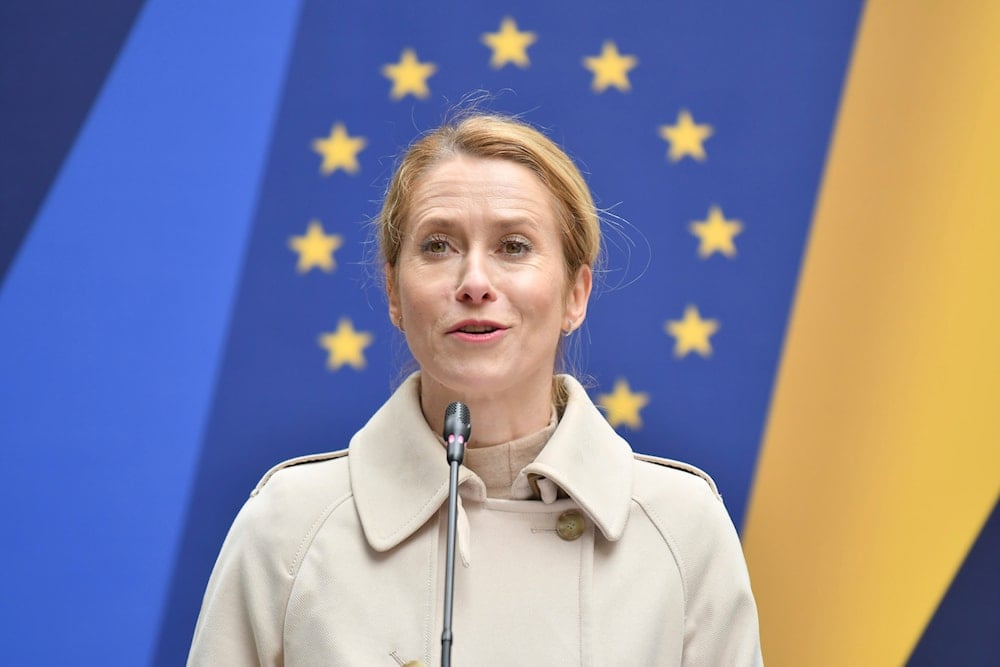EU's Kallas suggests easing Syria sanctions further: Reuters
The European Union is weighing additional relief from sanctions on Syria, including funding for key ministries and lifting restrictions on the Syrian Central Bank, in a bid to aid reconstruction and migration efforts.
-

High Representative of the European Union for Foreign Affairs and Security Policy Kaja Kallas speaks to journalists during the UA-EU foreign Minister's meeting in Lviv, Ukraine, on Friday, May 9, 2025 (AP)
European Union foreign policy chief Kaja Kallas has suggested easing European sanctions on Syria even further to enable financial support for Syrian ministries involved in sectors such as reconstruction and migration, Reuters reported on Friday.
EU foreign ministers are set to discuss relations with Damascus during an upcoming meeting in Brussels, as the bloc considers further easing sanctions after having already relaxed restrictions in sectors like energy, transport, reconstruction, and related financial transactions, with some member states advocating for additional relief to facilitate Syria’s transition.
According to the May 14 proposal outlined in the document, the EU would permit member states to finance Syria's defence and interior ministries for collaboration "in the areas of reconstruction, capacity-building, counter-terrorism and migration."
The proposal includes a special provision to give EU member states greater flexibility in engaging with Syrian state-owned entities concerning the destruction of chemical weapons, and also lifting sanctions on the Commercial Bank of Syria, but maintaining restrictions on individuals tied to Assad's former government.
According to three diplomats, officials are currently debating the potential removal of sanctions on Syria’s central bank, while Germany, Italy, the Netherlands, and Austria have jointly proposed a document, reviewed by Reuters, that advocates for lifting restrictions on both the central bank and other Syrian financial institutions.
EU lifts sanctions on Syria
On February 24, the European Council of the European Union announced the suspension of several restrictive measures related to the situation in Syria, explaining that this move aligns with the EU's ongoing efforts to promote an inclusive political transition in the country as well as to facilitate its rapid economic recovery, reconstruction, and stabilization.
The EU Council has decided to suspend sanctions in Syria's transport and energy sectors, including oil, gas, and electricity, while removing five entities, the Industrial Bank, Popular Credit Bank, Saving Bank, Agricultural Cooperative Bank, and Syrian Arab Airlines, from the list of those subject to asset freezes.
Previously, six EU nations advocated for the lifting of sanctions on January 13 in a document endorsed by Germany, France, the Netherlands, Spain, Finland, and Denmark, stating that the EU "should immediately begin adjusting our sanctions regime."
In its announcement, the EU said that it will allow "making funds and economic resources available to the Syrian Central Bank" and introduce exceptions to the ban on establishing banking relationships between Syrian banks and financial institutions within member state territories, permitting transactions related to the energy and transport sectors, as well as those necessary for humanitarian and reconstruction purposes.
In its announcement, the EU stated it will permit "making funds and economic resources available to the Syrian Central Bank" while creating exemptions to the prohibition on banking ties between Syrian financial institutions and those in member states, allowing transactions connected to energy and transport sectors along with those required for humanitarian aid and reconstruction efforts.

 3 Min Read
3 Min Read










